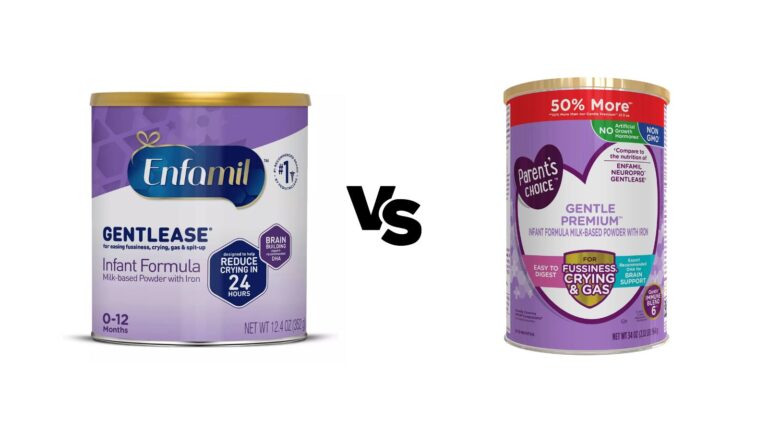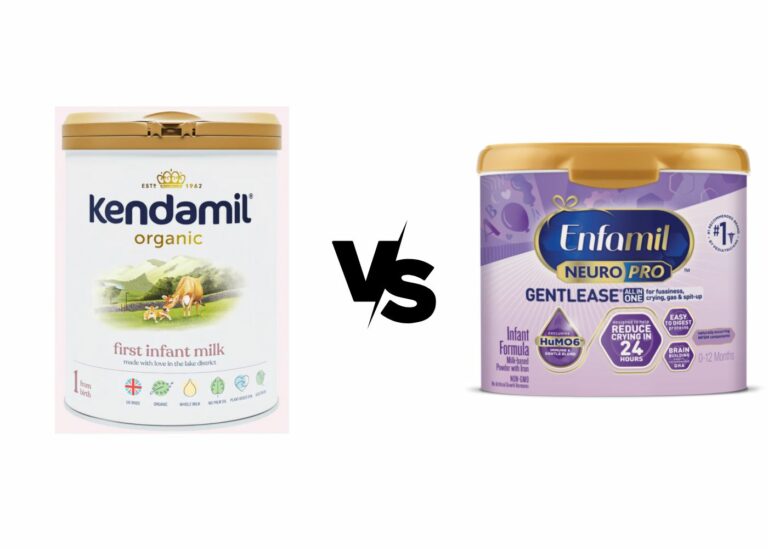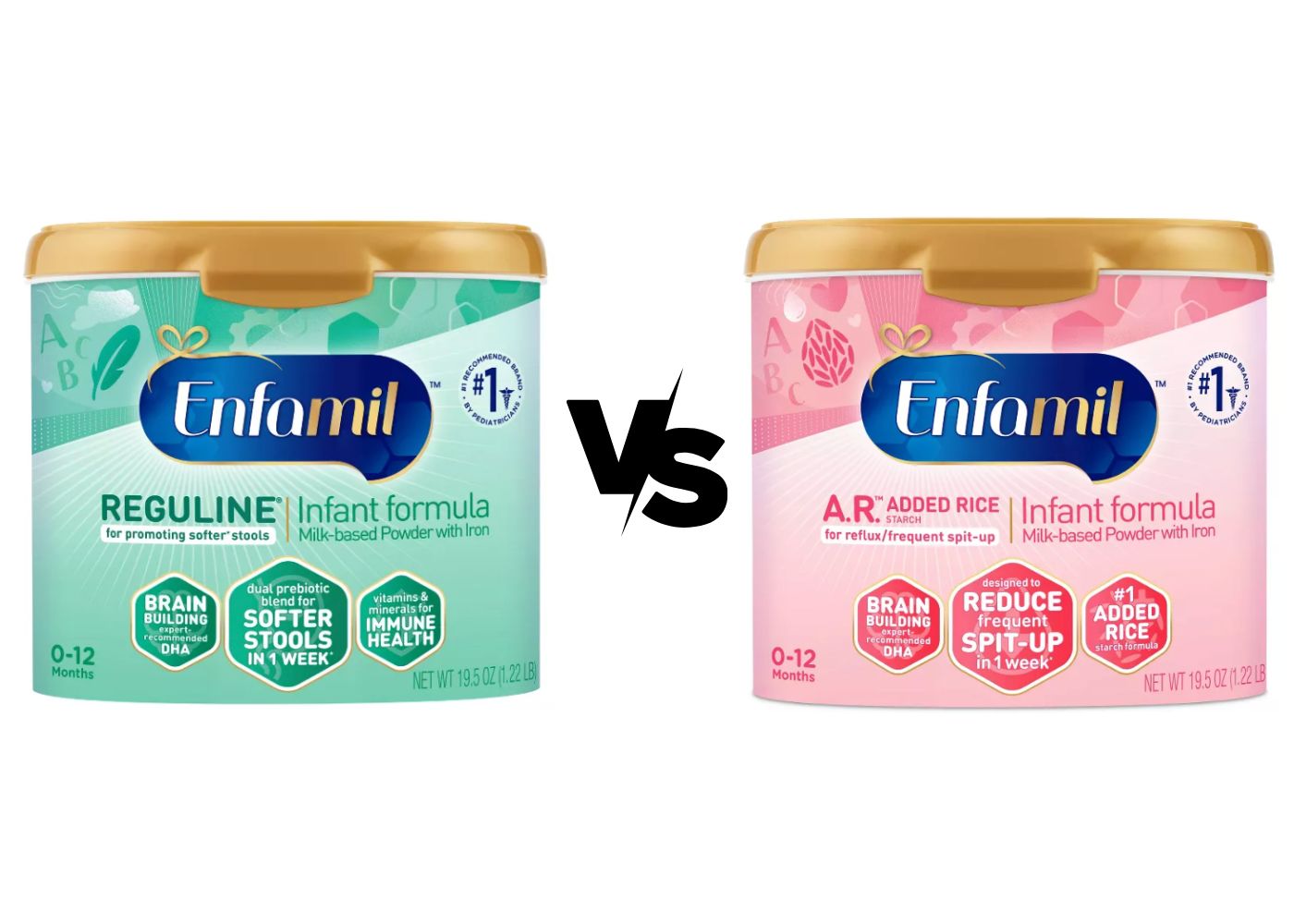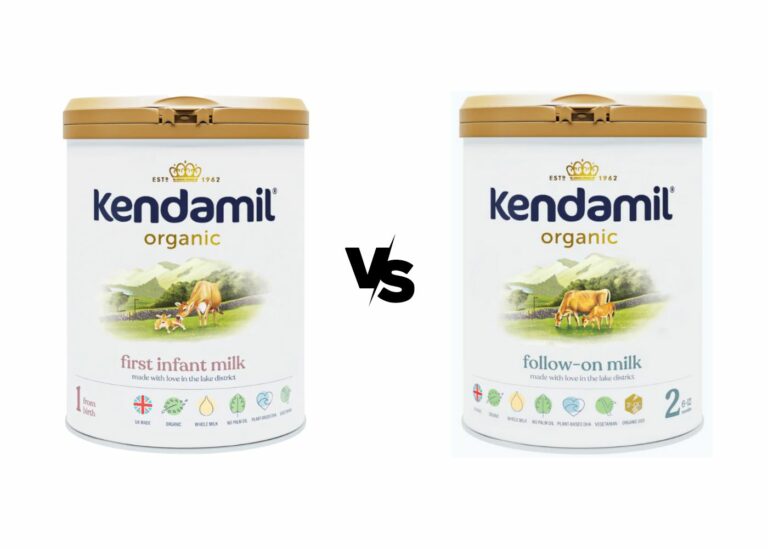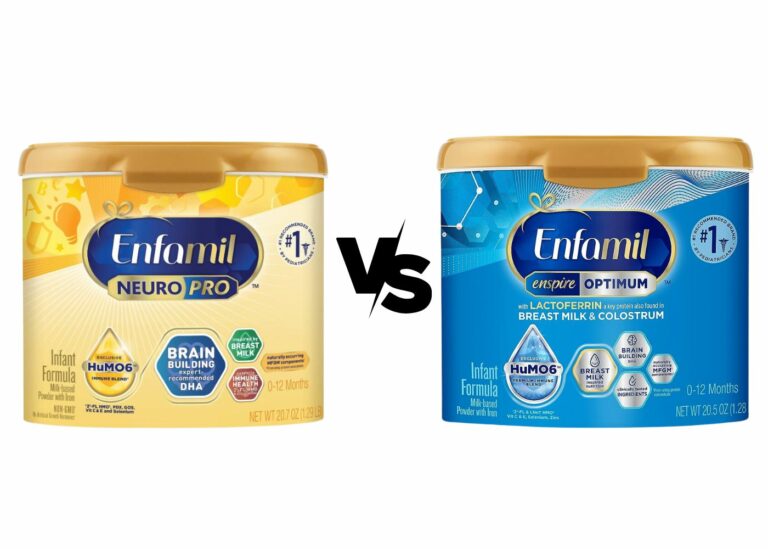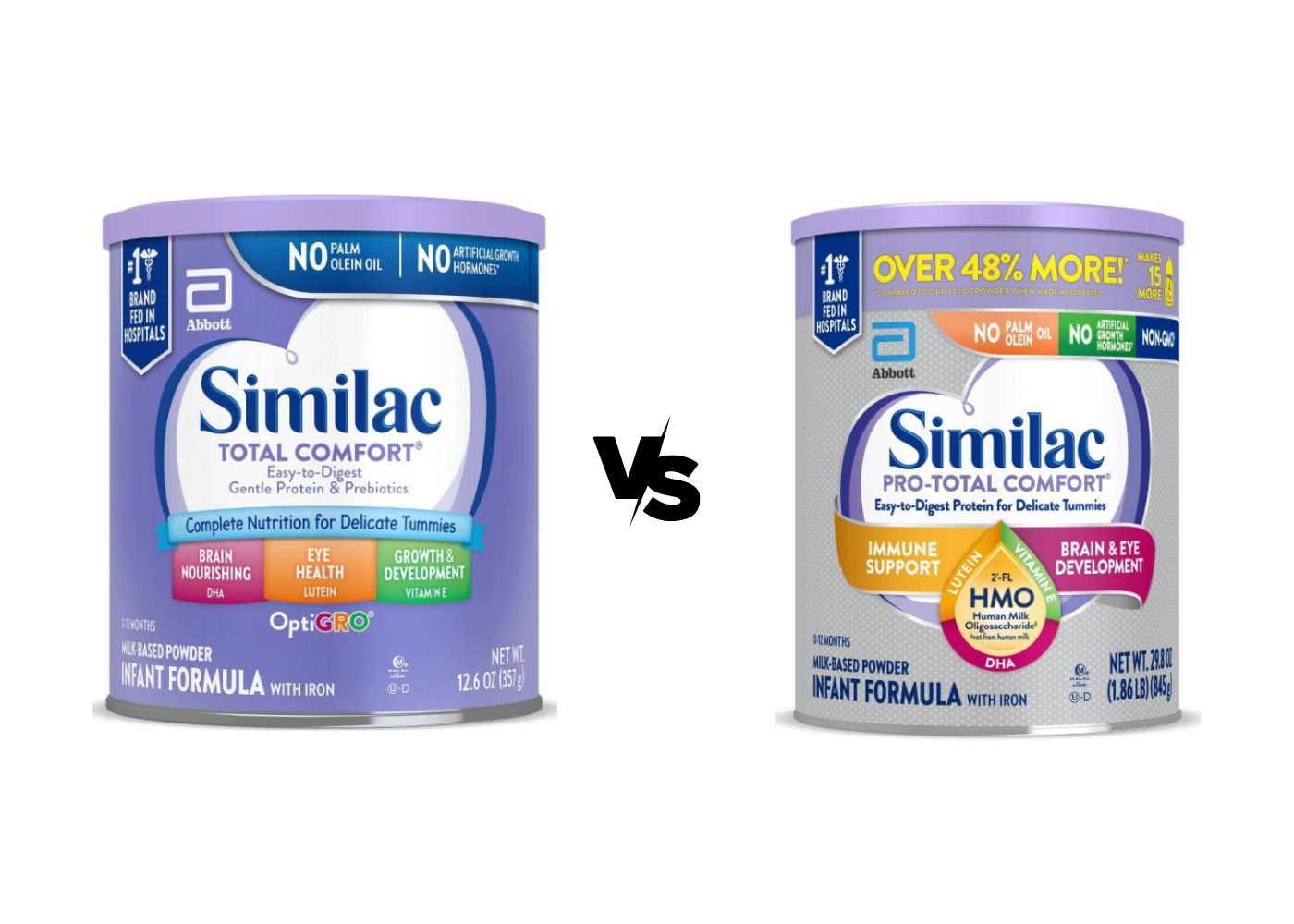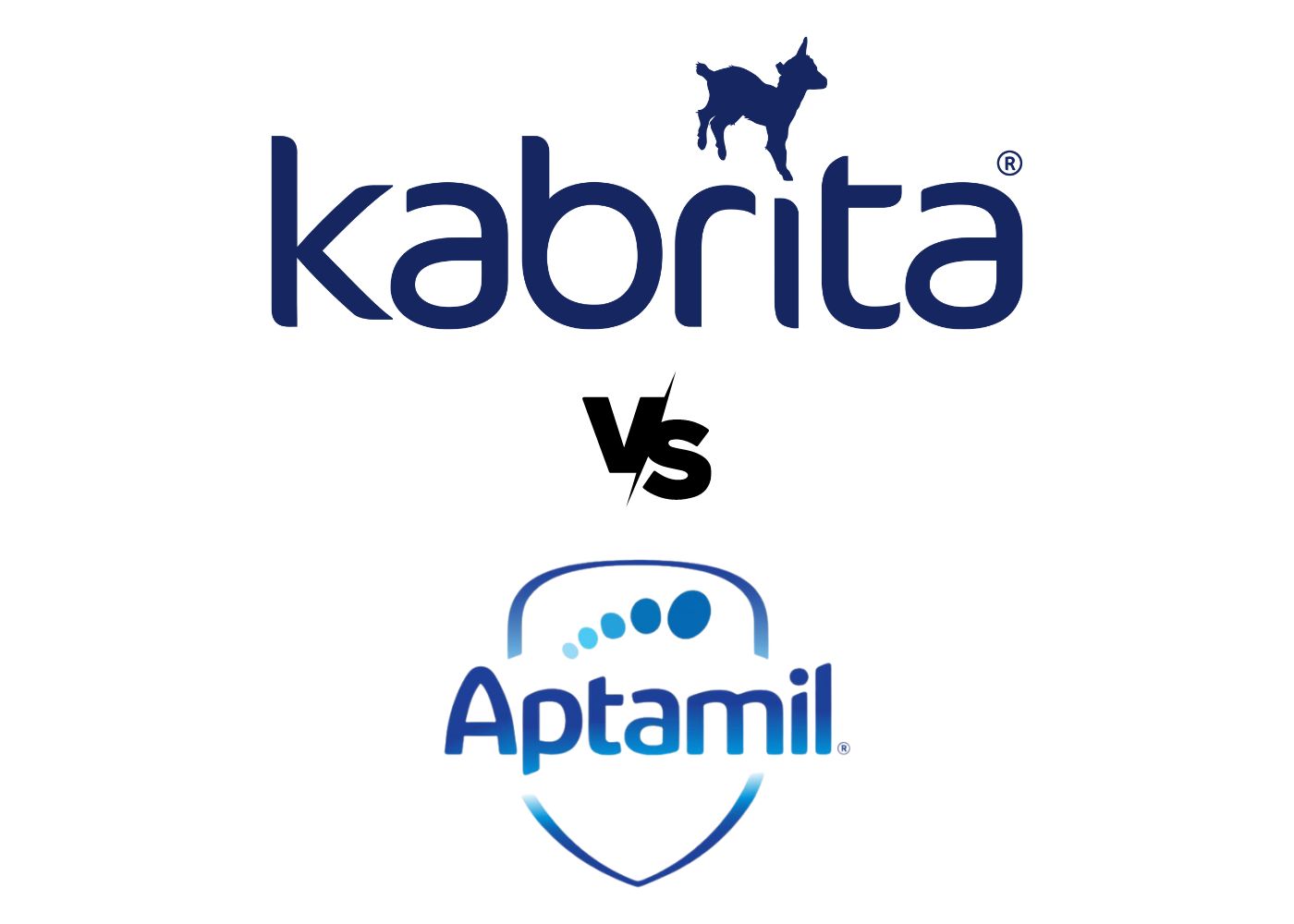
Key Differences Between Kabrita and Aptamil
| Key Differences | Kabrita | Aptamil |
|---|---|---|
| Origin | Netherlands | France (Manufactured in UK, Germany, etc.) |
| Farming Practices | Non-GMO farming | Depends on source, but likely conventional |
| Brand Reputation | Known for high-quality goat milk-based formulas | Known for cow’s milk-based formulas enriched with essential nutrients |
| Milk Source | Skimmed goat milk and goat whey protein concentrate | Skimmed cow’s milk and demineralized whey protein |
| Protein Content | 1.3g per 100ml, easier to digest | 1.3g per 100ml |
| Unique Protein Feature | Easier to digest due to smaller curds formed by goat milk proteins | Same whey:casein ratio as Kabrita, but cow’s milk proteins may be harder for some babies to digest |
| Carbohydrate Content | Lactose and GOS (prebiotic), 7.5g per 100ml | Lactose, GOS, FOS, and 2′-FL, 7.3g per 100ml |
| Carbohydrate Benefits | Promotes gut health | Supports baby’s gut health with a more diverse blend of prebiotics |
| Fats and Oils | Vegetable oils and high sn-2 palmitic acid oil, 3.5g of fat per 100ml | Milk fat and vegetable oils, 3.4g of fat per 100ml |
| Omega Fatty Acids | DHA and AA | AA and DHA |
| Prebiotics and Probiotics | GOS (prebiotic) from milk | GOS, FOS, and 2′-FL (prebiotics) |
| Cost and Availability | More expensive ($2 per ounce), can be hard to find | More affordable ($1.6 per ounce), availability can vary |
Blwstore is supported by its audience. When you buy through links on our site, we may earn an affiliate commission.
This article will compare two popular formulas: Kabrita vs Aptamil.
We will look at their reputations, ingredients, and nutritional composition to give you the information you need to make an informed decision.
We will use for the comparison Kabrita Stage 1 and Aptamil Advance, the two most popular formulas of each brand.
Let’s get after it!
Our Short Answer
In our honest opinion, if we had to choose, we would go for Kabrita for the following reasons:
1. The formula made with goat’s milk eliminates many digestive problems in many babies, being easier to digest.
Kabrita adds high sn-2 palmitic acid oil, a highly beneficial fatty acid in breast milk.
Cons?
Kabrita is more expensive than Aptamil and possibly harder to find.
This does not mean that Aptamil Advance is a bad formula; however, other Aptamil formulas add palm oil, so be sure to read labels well before deciding.

The Milky Box: Best place to buy Kabrita online
Use the code BLWSTORE for a 5% Off
At BLWStore, we may earn a commission from some of the products featured on our website through affiliate partnerships with retailers. We want to be transparent with our readers and let you know that we do not receive any products for special consideration. The commission we earn helps support our website and allows us to continue providing helpful information and product recommendations. Thank you for your support!
Brand Reputation
Kabrita: Renowned for high-quality goat milk-based formulas. Natural Dutch goat milk, strict European certification. Mild taste, rich in nutrients.
Aptamil: Reputable brand with cow’s milk-based formulas. Enriched with essential nutrients for the immune system, cognitive development, and growth energy and is inspired by breastmilk composition research.
Kabrita Reputation
Kabrita is a renowned baby nutrition brand known for its high-quality goat milk-based infant formulas. The brand prides itself on using 100% natural, premium Dutch goat milk manufactured under strict European infant certification. Kabrita ensures its products are free from pesticides, herbicides, steroids, or chemicals.
Families love the taste and smell of Kabrita’s goat milk formulas, describing them as mild, light, fresh, and delicious.
Notably, goat milk has some advantages over cow’s milk. Goat milk contains about 10 times more oligosaccharides than cow’s milk and higher amounts of vitamin A, riboflavin, calcium, potassium, and niacin. These essential nutrients contribute to the 22 vitamins and minerals found in Kabrita baby formulas.
Aptamil Reputation
Aptamil is another reputable brand in the arena of infant nutrition. It offers a range of cow’s milk-based formulas tailored to meet the nutritional needs of babies at different ages and stages of development.
Aptamil is committed to creating baby formulas inspired by breastmilk composition research. Their products are enriched with essential nutrients like LCPs (Long-chain polyunsaturated fatty acids), GOS (Galacto-oligosaccharides), FOS (Fructo-oligosaccharides) and 2′-FL (2′-Fucosyllactose).
These elements aim to support babies’ immune systems and cognitive development while providing them with the necessary energy for growth.
Nutritional Composition
Kabrita: Goat whey protein concentrate, easier to digest. Carbohydrates from lactose and GOS prebiotics. Fats from vegetable oils, including high sn-2 palmitic acid oil. Essential fatty acids, including DHA and AA.
Aptamil: Skimmed cow’s milk and demineralized whey protein. Carbohydrates from lactose, GOS, FOS, and 2′-FL. Fats from milk fat and vegetable oils. LCPs like AA and DHA.
Kabrita wins in protein (easier to digest) and fat (with high sn-2 palmitic acid) content. Technical tie in carbohydrate content.
Protein Content
Kabrita: The main protein source in Kabrita stage 1 goat milk formula is goat whey protein concentrate powder. Per 100ml prepared feed, Kabrita provides 1.3g of protein, consisting of 0.84g whey protein and 0.5g casein protein. Goat milk proteins are easier to digest than cow’s milk proteins as they form smaller curds in the baby’s stomach.
Aptamil: Aptamil’s primary protein source is skimmed cow’s milk and demineralized whey. In each 100-prepared feed, Aptamil also contains 1.3g of protein. Although cow milk-based formulas are generally more accessible than goat milk-based ones, some babies might experience difficulty digesting cow’s milk proteins.
Both formulas have 60:40 whey to casein ratios, which is what we like to see.
However, the fact that Kabrita uses goat milk makes it the winner in the protein aspect of this comparison since it is easier to digest.
The problem is that it is less widely available.
Carbohydrate Content
Kabrita: Kabrita uses lactose derived from goat milk as its main carbohydrate source, providing 7.5g of carbohydrates per 100ml prepared feed. In addition to lactose (6.9g per serving), Kabrita also contains galacto-oligosaccharides (GOS) (0.39g per serving), which serve as a natural prebiotic to aid digestion and absorption.
Aptamil: Like Kabrita, Aptamil also uses lactose as its primary carbohydrate source (7.3g per 100ml prepared feed). It features a blend of galacto-oligosaccharides (GOS) (0.48g per serving), fructo-oligosaccharides (FOS) (0.08g per serving), and 2′-fucosyllactose (2′-FL) (0.10g per serving) as additional fiber sources to support a baby’s gut health.
Both formulas use lactose as the only sugar source, which is what you should look for in a formula unless your baby has problems digesting it.
Fats and Oils
Kabrita: Kabrita’s formula contains a blend of vegetable oils, including coconut oil, rapeseed oil, and sunflower oil. It also includes high sn-2 palmitic acid oil, a natural fatty acid in human milk that improves metabolism and mineral balance. The formula has 3.5g of fat per 100ml prepared feed, supplying essential fatty acids like linoleic acid (Omega 6, 0.54g per serving), a-linoleic acid (Omega 3, 56mg per serving), docosahexaenoic acid (DHA, 15mg per serving), and arachidonic acid (AA, 15mg per serving).
Aptamil: Aptamil’s blend of fats consists of anhydrous milk fat and various vegetable oils such as sunflower oil, rapeseed oil, high oleic sunflower oil, and coconut oil. The prepared feed contains 3.4g of fat per 100ml with essential fatty acids including LCPs like arachidonic acid (AA) (0.017g per serving) and docosahexaenoic acid (DHA) (0.017g per serving).
Kabrita is slightly ahead in fat content thanks to the addition of high sn-2 palmitic acid oil, a fatty acid in breast milk that is very beneficial.
None of the formulas uses palm oil or olein, or soy oil, which is perfect.
Probiotics and Prebiotics
Kabrita: Contains GOS prebiotics for a healthier gut microbiome.
Aptamil: Contains a blend of GOS, FOS, and 2′-FL prebiotics.
Aptamil adds extra prebiotics, which is perfect since it is cow milk-based.
Kabrita: Kabrita Stage 1 goat milk formula includes galacto-oligosaccharides (GOS), derived from milk, which serve as prebiotics. Prebiotics are non-digestible fibers that feed the beneficial bacteria in the gut, resulting in a healthier gut microbiome. The presence of GOS in Kabrita is important because it helps to support your baby’s digestive health by promoting the growth of friendly bacteria.
Aptamil: Aptamil Advance’s formula contains a combination of galacto-oligosaccharides (GOS), fructo-oligosaccharides (FOS), and 2′-fucosyllactose (2′-FL). Similar to Kabrita, these ingredients act as prebiotics, fostering beneficial gut bacteria growth. The blend of GOS, FOS, and 2′-FL supports healthy digestive function for babies.
Cost and availability
Kabrita: Priced at around $2 per ounce, Kabrita Stage 1 goat milk formula is considered premium compared to other infant formulas. Buying it online may offer more extensive availability depending on your location, as it can be difficult to find in local stores.
Aptamil Advance: It is more affordable than Kabrita, costing approximately $1.6 per ounce. Like with Kabrita, finding Aptamil Advance in local stores might be challenging, so consider browsing online retailers for a more accessible option.
Best Places to Buy Kabrita and Aptamil
Kabrita

The Milky Box: Best place to buy Kabrita online
Use the code BLWSTORE for a 5% Off
MyOrganicCompany provides Premium organic, GMO-free baby formulas for the healthiest start.
- Founded by parents
- Global top-tier nutrition
- Integrity, compassion, teamwork
Aptamil
You can buy Aptamil in the US in the following stores:
What are the best alternatives to Kabrita and Aptamil?
Kabrita Alternatives
Kendamil Goat: Kendamil Goat formula is made from whole goat milk, providing a rich source of vitamins and minerals. It contains no palm oil, fish oil, or GMO ingredients, making it a wholesome choice for parents. *Read: Kendamil vs Kabrita
Nannycare: Nannycare offers goat milk-based infant formula sourced from New Zealand. Their products contain no added whey proteins, ensuring a natural balance of vitamins, minerals, and essential fatty acids. *Read: Nannycare vs Kabrita
Jovie: Jovie’s goat milk formula is enriched with all the necessary nutrients for your baby’s growth and development. It contains DHA and ARA from algae oil sources instead of fish oil, making it an excellent option for families seeking vegetarian-friendly formulas. *Read: Kabrita vs Jovie
Holle Goat: Holle offers high-quality organic goat milk-based infant formula that provides carefully balanced nutrition without synthetic ingredients or preservatives. *Read: Holle vs Kabrita
Aptamil Alternatives
Kendamil Organic: Made in the United Kingdom with organic whole cow’s milk sourced from local farms, Kendamil Organic provides essential nutrients, including DHA derived from algae to support your baby’s brain development. *Read: Kendamil vs Aptamil
Holle: Holle offers high-quality organic cow’s milk formulas made with biodynamic ingredients without artificial additives or GMOs. *Read: Holle vs Aptamil
Bobbie: Formulated in line with EU standards and manufactured in the United States, Bobbie provides balanced nutrition with pure and organic ingredients. *Read: Bobbie vs Aptamil
Last Words
Thank you for reading until the end.
We hope this comparison between Kabrita and Aptamil has helped you choose the best option for your baby.
Please, if you have any questions, feel free to comment below, and we will get back to you in less than a day.
See you soon!
We’re Maria and Alberto, a married couple and educators who are nutrition enthusiasts. Even before we had kids, we were already crazy about nutrition.
We’d read scientific articles, watch videos from nutritionists, and spend hours listening to nutrition podcasts.
Today, we continue doing this, but in a different way, as we’ve learned to sift through the noise and trends. Nutrition, like any other field of knowledge, the more you read and learn, the more you develop a comprehensive understanding of reality, and that’s what has happened to us.
Before having our first child, we focused on learning everything we could about child nutrition, using the same techniques we had already employed, backed by our extensive knowledge in nutrition.
Our mission is to help other parents with their children’s nutrition, to help them become the best versions of themselves.
If we are what we eat and drink, which is absolutely true, let’s do it right!



